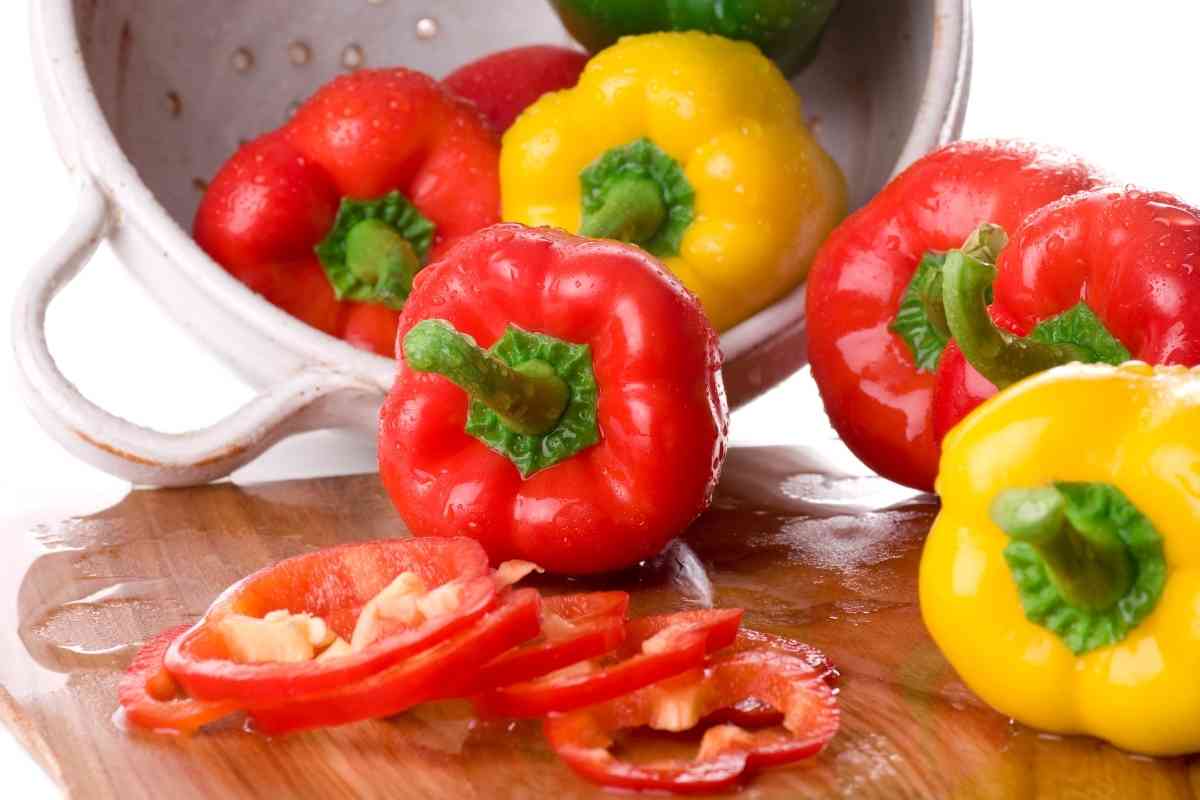Can Puppies Eat Bell Peppers? The Red, Geen, And Yellow Truth!
While it is reasonable to think that food that is nourishing to us is equally nutritious for our pets, this is unfortunately not always the case. Pet owners may find it challenging to recall which human foodstuffs are toxic or safe for canines to consume. Some veggies, like broccoli and carrots, can be utilized as nutritious and natural substitutes for manufactured dog treats, but can puppies eat bell peppers? Let’s find out.

Are bell peppers safe for puppies?
It’s safe for your dog to eat bell peppers. They are beneficial to dogs as they provide vitamins and nutrients and improve gut health. However, to protect your dog’s health, watch out for a few things before including bell peppers in their diet.
If you decide to give your dog bell peppers, ensure you are very cautious of the quantity. While they are nutritional, they can be detrimental to your dog’s health when given in excess. Red bell peppers are the healthiest of all bell pepper colors and are suitable for your canine companion.
You are often advised to consult with your veterinarian since they better understand your dog’s health before including bell peppers or other new items in your dog’s diet. Dogs are different, and just because the peppers have no adverse effect on your neighbor’s dogs doesn’t mean they will work well with your furry companion.
Are Bell Peppers Healthy For Dogs?
While bell peppers are incredibly healthy and helpful to humans, this delicate, crunchy vegetable is safe for your dog to consume. But, before using bell peppers in your diet, there are a few precautions to look out for to ensure your dog’s health.
These include:
Use No Seasonings
Peppers should never be salted or seasoned, and you should never feed your furry buddy peppers that have been combined with onions or garlic because those are toxic to canines. Furthermore, avoid giving your hot dog chili peppers like jalapenos.
Dispense A Lot of Water
Just like humans, water is significantly essential to the life of dogs. For safety and nutrient absorption concerns, water must always be available while cooking or giving your dog raw veggies, such as bell peppers.
If they don’t drink enough water, they could experience gut problems like vomiting or diarrhea, which, if left untreated, can lead to dehydration. Since your furry buddy’s body doesn’t absorb water like ours, dogs that consume vegetables risk rapidly dehydrating.
Steam the bell Pepper
The outer shell of bell pepper can sometimes be challenging to chew. To relieve your pup of this burden, you can steam or puree the peppers to make it simpler for your puppy to eat and digest.
Make Sure the Bell Peppers are Clean
Only give your dog clean food regardless of what it is. Bugs, mold, and germs will develop in your dog’s bell pepper if you don’t wipe it out before giving it to them.
These germs increase your puppy’s risk of getting sick or pneumonia, making it challenging for the canine to eat or drink.
Chop the Peppers
Cut the bell peppers into little pieces if you plan to use them as dog treats. Be sure to slice them thin enough to reduce the risk of choking. Regardless of how big or small your dog is, treats shouldn’t make up more than 10% of your pet’s daily caloric consumption.
Don’t Give Them Too Many Peppers
These flavorful, energizing, and crunchy peppers are great all-natural treats you may give your dog. Nevertheless, even good things shouldn’t be overdone as they could defeat their purpose.
Like any other human food, bell peppers should be introduced to your dog’s diet gradually and moderately to see how your dog reacts. Some dogs won’t mind it at all, while others will.
Large dogs should eat more than half of the pepper and little dogs no more than a quarter.
If you give your dog more than this, it can vomit, have diarrhea, or experience stomach distress.
Remove the Bell Pepper Seeds
You needn’t be concerned about letting your dog eat bell pepper seeds; the only concern is whether the seeds might cause indigestion or disturb your pet’s stomach. To avoid any unforeseen situations, remove the seeds.

Is the Color of the Bell Pepper Important?
Red bell peppers are the most nutrient-dense since they contain essential vitamins and minerals and are best for a dog’s health, but any color of bell pepper is acceptable for your four-legged friend.
Vitamins A, E, and C, as well as antioxidants, are abundant in red bell peppers. The red peppers’ high vitamin content boosts the immune system of your pet.
Due to their anti-inflammatory qualities, they are especially helpful for adult dogs that suffer from joint pain.
Red bell peppers contain nine times more beta carotene than yellow or green kinds, which is good for your dog’s eyes and coat. A great option if you’re looking for a natural way to boost your dog’s health is red bell peppers.
Benefits Of Bell Peppers For Your Dog’s Health
For your dog, bell peppers have several advantages. They consist of:
Fewer Calories
Bell peppers have low calories and high vitamins and nutrients that are good for the skin, hair, and eyes, so your dog will like eating them. The low calories are crucial if your dog is obese and you need them to lose weight while maintaining the quantity of food. You could substitute their food with bell peppers.
Bell peppers are another high-fiber meal that benefits your dog’s digestive system. Your dog won’t suffer from constipation if they maintain a healthy intake of bell peppers.
Rich in Vitamins
Vitamins A, E, and B6, which support your dog’s nervous system, are among the vitamins in bell peppers that benefit your dog’s health. Vitamin C, which is present in bell peppers and is a potent antioxidant that strengthens your dog’s defenses and fights inflammation, is another excellent source of nutrients.
Beneficial to Gut Health
Bell peppers are rich in nutritional fiber and low in calories. Foods high in fiber help people keep hydrated and support digestive health.
Plentiful Nutrients
Dogs transform the abundant beta-carotene in bell peppers into an active version of vitamin A. In addition to having more potassium, folate, and lutein than yellow or green bell peppers, red bell peppers have higher beta carotene levels.
Assist in Preventing Parasites in Dogs
Many dog owners cling to the unproven urban myth that peppers help keep their dogs free of parasites, especially worms. However, neither a clear source for the theory nor any supporting evidence is available. But it doesn’t hurt to try.
Consult your veterinarian if you believe your dog may have worms or another parasite. If your dog needs any treatments, the veterinarian will discuss them with you and offer advice on how to avoid parasites in the future.
Does Giving Your Dog Bell Peppers Have any Risk
Bell peppers can become uncomfortable if given in surplus and irritated if given in excess. The peppers appear to have fiber, which may result in diarrhea and flatulence. After the initial bell pepper meal, it’s crucial to watch your dog for allergic reactions. Your veterinarian can inform you if bell peppers are healthy for your dog.